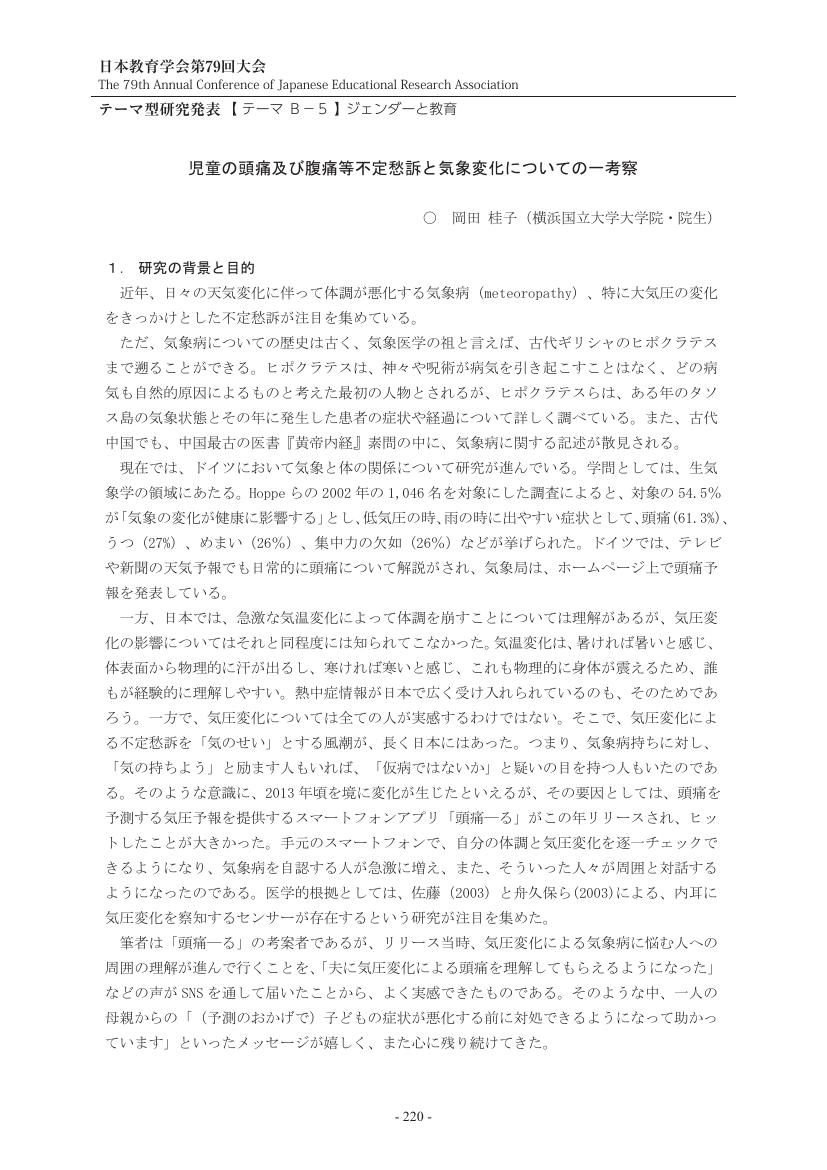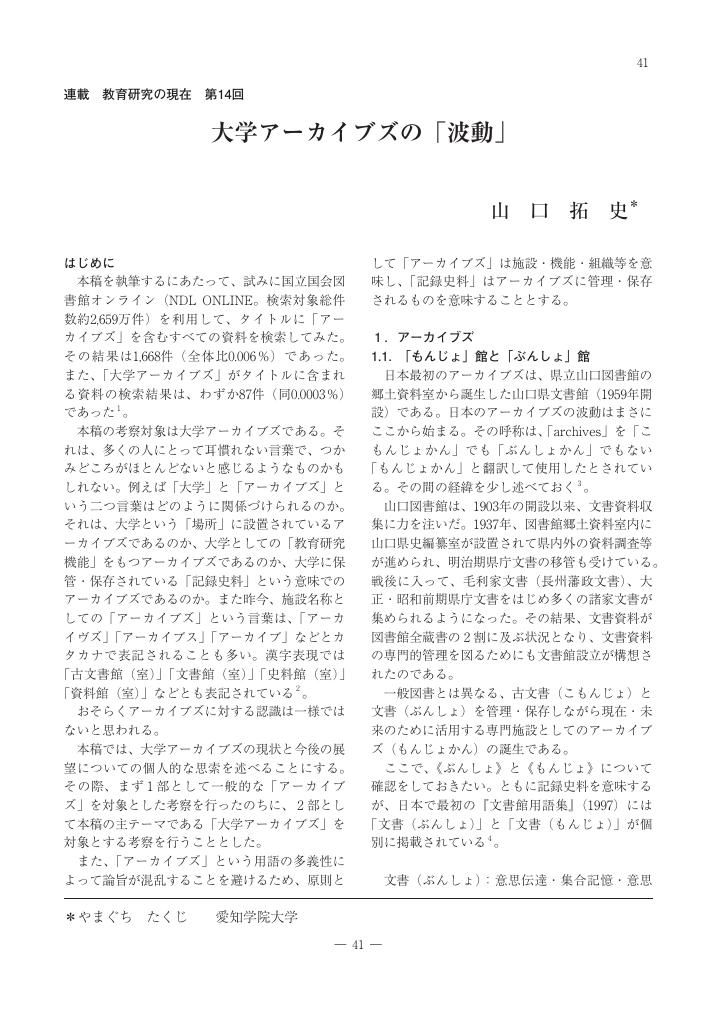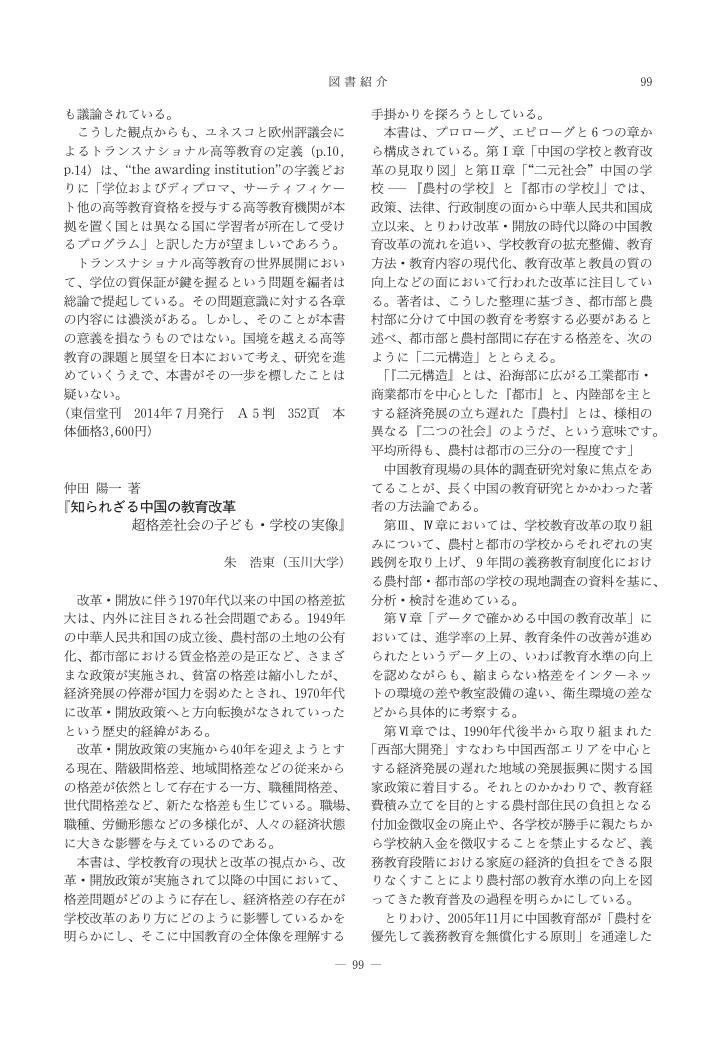2 0 0 0 OA 児童の頭痛及び腹痛等不定愁訴と気象変化についての一考察
- 著者
- 岡田 桂子
- 出版者
- 一般社団法人 日本教育学会
- 雑誌
- 日本教育学会大會研究発表要項 (ISSN:2433071X)
- 巻号頁・発行日
- vol.79, pp.220-221, 2020-08-24 (Released:2020-11-25)
2 0 0 0 OA 大学アーカイブズの「波動」
- 著者
- 山口 拓史
- 出版者
- 一般社団法人 日本教育学会
- 雑誌
- 教育学研究 (ISSN:03873161)
- 巻号頁・発行日
- vol.86, no.1, pp.41-51, 2019 (Released:2019-10-12)
- 参考文献数
- 20
2 0 0 0 OA 「キンゼイ報告」の教育思想史的位置 : 特に1980年代"文化状況"のなかでの再評価
- 著者
- 斎藤 正二
- 出版者
- 一般社団法人 日本教育学会
- 雑誌
- 日本教育学会大會研究発表要項 (ISSN:2433071X)
- 巻号頁・発行日
- vol.40, pp.6, 1981-08-28 (Released:2018-04-20)
2 0 0 0 OA J. S. ハクスリーにおける教育への進化論的関心
- 著者
- 笹原 英史
- 出版者
- 一般社団法人 日本教育学会
- 雑誌
- 教育学研究 (ISSN:03873161)
- 巻号頁・発行日
- vol.61, no.2, pp.158-167, 1994-06-30 (Released:2009-01-13)
- 参考文献数
- 63
- 著者
- 渡辺 かよ子
- 出版者
- 一般社団法人 日本教育学会
- 雑誌
- 教育学研究 (ISSN:03873161)
- 巻号頁・発行日
- vol.66, no.3, pp.278-286,367, 1999-09-30 (Released:2007-12-27)
1990年代の高等教育改革は多くの教養に関する議論を生み出した。教養とはPaideiaやBildungに相当する日本語である。それは1910年代から今日まで知識人の理想的資質を表現する言葉であり、今日の教養に関する議論は近代日本の歴史上、第4度目の興隆と位置付けられる。今日のポスト大衆化段階の高等教育における教養に関する議論の特徴としてはその主なる関心が、学問研究よりもカリキュラムや教育にあることである。このことは戦後の教育学が最大の課題の一つとしてきた一般高等教育(国民的教養)の創出に向けての妥当な回答といえるのであろうか。この問いへの思想史的前提を探求するため、本稿は人格形成の二つの様式である修養と教養の分離と連関を、両者の分離から教養という現代的意味が確定された1930年代の議論に遡って分析する。修養とは前近代的な人格形成思想であり、それは過度な瑣末な知識を持つことを戒め、勤勉と誠を説いた。 1930年代には年配の世代は、教養と修養とほとんど同じ意味でしようしていたが、両者の違いは明白であった。教養は全体的人間性を意味し、修養は知性や知識に優先して道徳の重要性を説いていた。教養は近代化過程における西洋文化の影響下で生み出され、一方修養は中世以来の自国文化に根源をもつものである。 教養と修養はまたその科学との関係においても区別され、教養は保守性と革新性との均衡を強調する点で、修養と科学の中間に位置づけられていた。教養と修養の決定的な違いはその主知主義にあった。そのため教養論者は当時の教育が知育偏重と見なされている状況を批判した。教養論者にとって知識に過多はなく、知識なしに適切な判断をなすことは不可能なことであった。1930年代には教養はその学問研究との連関において、人格形成の二つの局面から議論を展開していた。一つは学問の専門分化に対応するための学びの幅に関することであり、総合的で一貫した知識と関心を持つことが推奨された。もう一つは、専門分化した学問研究の過程において獲得される教養の深さに関することであり、専門的研究における無私の努力が人物を鍛錬し、尊敬に値する人格を形成すると考えられた。学問的鍛錬による人格形成という点では、教養は修養たる種の関連性をもっていた。 修養と教養の分離と連関の歴史的分析から、知識の幅のみならず、「真の」教養ないしは人格形成としてとらえらえてきた深さと学問的鍛錬のためにも高等教育機関における意味ある学びを考える必要があるといえよう。
2 0 0 0 OA 土屋 基規 著『戦後日本教員養成の歴史的研究』
- 著者
- 岩田 康之
- 出版者
- 一般社団法人 日本教育学会
- 雑誌
- 教育学研究 (ISSN:03873161)
- 巻号頁・発行日
- vol.85, no.4, pp.510-513, 2018 (Released:2019-10-12)
2 0 0 0 OA 教育研究と教育実践における批判的実在論(クリティカル・リアリズム)の可能性
- 著者
- 近森 憲助 谷村 千絵 上野 正恵
- 出版者
- 一般社団法人 日本教育学会
- 雑誌
- 教育学研究 (ISSN:03873161)
- 巻号頁・発行日
- vol.84, no.4, pp.455-465, 2017-12-31 (Released:2018-04-27)
- 参考文献数
- 11
2 0 0 0 OA 19世紀前期養生論における人間形成観の考察
- 著者
- 瀧澤 利行
- 出版者
- 一般社団法人 日本教育学会
- 雑誌
- 教育学研究 (ISSN:03873161)
- 巻号頁・発行日
- vol.57, no.2, pp.159-168, 1990-06-30 (Released:2009-01-13)
- 参考文献数
- 61
- 著者
- 鈴木 久米男
- 出版者
- 一般社団法人 日本教育学会
- 雑誌
- 日本教育学会大會研究発表要項 (ISSN:2433071X)
- 巻号頁・発行日
- vol.77, pp.63-64, 2018 (Released:2019-12-05)
- 著者
- 鳥居 朋子 森 朋子
- 出版者
- 一般社団法人 日本教育学会
- 雑誌
- 日本教育学会大會研究発表要項 (ISSN:2433071X)
- 巻号頁・発行日
- vol.78, pp.226-227, 2019-07-10 (Released:2020-01-30)
- 参考文献数
- 2
2 0 0 0 OA 仲田 陽一 著『知られざる中国の教育改革 超格差社会の子ども・学校の実像』
- 著者
- 朱 浩東
- 出版者
- 一般社団法人 日本教育学会
- 雑誌
- 教育学研究 (ISSN:03873161)
- 巻号頁・発行日
- vol.83, no.1, pp.99-100, 2016 (Released:2016-06-27)
2 0 0 0 OA 片岡 栄美 著『趣味の社会学 文化・階層・ジェンダー』
- 著者
- 寺崎 里水
- 出版者
- 一般社団法人 日本教育学会
- 雑誌
- 教育学研究 (ISSN:03873161)
- 巻号頁・発行日
- vol.87, no.2, pp.256-258, 2020 (Released:2020-09-30)
- 著者
- 林 寛平
- 出版者
- 一般社団法人 日本教育学会
- 雑誌
- 教育学研究 (ISSN:03873161)
- 巻号頁・発行日
- vol.86, no.2, pp.213-224, 2019 (Released:2019-10-12)
- 参考文献数
- 33
比較教育学は「政策移転」の概念を用いてきたが、「教育の輸出」事象においては輸出側の優位性を保持し、利益を確保し続けるためにトランスフォーメーションが疎外される。本稿はPartnership Schools for Liberia(PSL)の事例を用いて、トランスフォーメーションを意図しない新しい形の政策移転の特徴を明らかにし、「教育の輸出」において「パッケージ化された学校」を購入するという事象を分析するための枠組みを構築する必要性があることを指摘する。
2 0 0 0 OA 教育は誰のものか—格差社会のなかの「学校選び」—
- 著者
- 志水 宏吉
- 出版者
- 一般社団法人 日本教育学会
- 雑誌
- 教育学研究 (ISSN:03873161)
- 巻号頁・発行日
- vol.82, no.4, pp.558-570, 2015 (Released:2016-05-18)
- 参考文献数
- 33
- 被引用文献数
- 1
本稿では、「教育の公共性」という問題を考える際の切り口として「学校選び」という現象を取り上げる。近年「ペアレントクラシー」という言葉が生みだされるほどに、「教育を選ぶ」人の存在が際立つようになっている。それと軌を一にするように、公教育内部の「差異化」を推し進める新自由主義が日本では主流となり、公教育の実質的な解体が進行しつつあるように思われる。特定の階層・集団のみを利することのなき、オープンかつコモンな公教育制度の再構築がのぞまれる。
2 0 0 0 OA 算数・数学の学力と数学的リテラシー(<特集>公教育とリテラシー)
- 著者
- 長崎 栄三
- 出版者
- 一般社団法人 日本教育学会
- 雑誌
- 教育学研究 (ISSN:03873161)
- 巻号頁・発行日
- vol.70, no.3, pp.302-313, 2003-09-30 (Released:2007-12-27)
Mathematical academic abilities and mathematical literacy is considered from the Japanese and international context. On considering academic abilities and literacy, a framework that grasps those is discussed. There is an ambiguity of the words, 'academic abilities' and 'literacy'. As a measure for overcoming the ambiguity, three levels of curriculum that was proposed by the International Association for the Evaluation of Educational Achievement -IEA- is recommended to use: intended curriculum, implemented curriculum and attained curriculum. Firstly, the change of mathematical academic abilities and mathematical literacy since the Meiji era is summarized focusing on educational objectives and objectives for evaluation of primary and secondary mathematics education. Mathematical academic abilities and mathematical literacy in the Meiji era were composed of computational skills as substantial discipline and spiritual training as formal discipline. Through the scientific spirits by Kinnosuke Ogura and the mathematical considering or methods by Ryoichiro Sato in Taisho era and the mathematical thought by Naomichi Shiono in the beginning of Showa era, ways of mathematical thinking has been aimed after the war and enjoyment of mathematical activities is currently added as objectives. Mathematical literacy has been advocated since the 1980's by a group of Japanese mathematicians with upper secondary and university mathematics education in mind. Next, it is revealed based on the Japanese situation that mathematical academic abilities and mathematical literacy are different as views on mathematics education are different. Mathematics, education and mathematics education have their own views on such, and different abilities and literacy are identified based on the three views. In views on mathematics education by mathematics or education, objectives for its education tend to acauire mathematics knowledge and skills. ln view on mathematics education by such, objectives for mathematics education are to foster abilities and attitudes to think mathematically. It has its view of learning that children create their own. They are also discussed in other countries. In some countries, standards on mathematics processes as well as standards on mathematics contents are set. In the standards on the processes of such, representation, reasoning, communication, connection and problem solving are included. With reference to these discussions mentioned above, methodology for constructing mathematical academic abilities is described based on the view of mathematics education as follows: structuralizing mathematical academic abilities as objectives, systematizing instruction to foster it and concretizing evaluation of mathematical academic abilities. Finally, both content aspects and cognitive/affective aspects are proposed as mathematical academic abilities. bearing both children's growth and social development in mind. Regarding on mathematics content aspect, mathematics expressions and mathematics proof are included. Five strands of cognitive/affective aspects: 'understanding', 'processing', 'thinking', 'using' and 'enjoying' are proposed to foster mathematical academic abilities through learning the content. As future tasks, empirical research on mathematical academic abilities bearing educational values in mind and teacher education are presented.
- 著者
- 鈴木 篤
- 出版者
- 一般社団法人 日本教育学会
- 雑誌
- 教育学研究 (ISSN:03873161)
- 巻号頁・発行日
- vol.86, no.2, pp.262-274, 2019
<p> 社会システムの存続のためにはコミュニケーションの継続が不可欠であり、その際に重要となるのが関係調整メカニズムとしての道徳である。「尊重/軽視」という道徳のコードは排除をもたらす可能性も持つが、排除された者同士の間での再包摂を生み出すものでもある。また、異なるプログラムを有する集団も、相手集団の行為の傾向性に関する知識を蓄積させることで、お互いの予期、すなわち双方向的な理解(「尊重」)を生み出すことも可能になる。</p>
2 0 0 0 OA 東アジアにおける「大学」概念の形成と変容
- 著者
- 米澤 彰純 嶋内 佐絵 劉 靖
- 出版者
- 一般社団法人 日本教育学会
- 雑誌
- 教育学研究 (ISSN:03873161)
- 巻号頁・発行日
- vol.86, no.2, pp.225-236, 2019 (Released:2019-10-12)
- 参考文献数
- 48
本稿は、日・中・韓・英の四言語の文献・資料の検討を通じ、東アジアの「大学」概念・アイデンティティが、この地域に存在する複数言語による多元的な翻訳を伴う思索において、どのように定義され、変容し、そこにどのような展望と陥穽が想定されるかを、その基盤となる国際社会に注目して、19世紀半ば以降の東アジアにおける近代大学の移植が本格化した時期から冷戦期までと、その後現在までとの時代区分をしたうえで検討する。
- 著者
- 白水 浩信
- 出版者
- 一般社団法人 日本教育学会
- 雑誌
- 教育学研究 (ISSN:03873161)
- 巻号頁・発行日
- vol.78, no.2, pp.162-173, 2011-06-30 (Released:2017-11-28)
本稿は、教育(education)の原義を能力を引き出すこととする語源解釈から福祉との連携を図る言説を批判的に検証するものである。人間をその能力において把捉し、国力の増大、社会的福祉の増進を目指そうとする統治言説の系譜は、西洋では近代ポリス論にまで遡りうる。教育と福祉を接合するこの基本的視座を克服すべく、教育の語源を歴史的に再検討し、それが食に支えられた養生の営みであったことを明らかにする。
2 0 0 0 OA 語らない子どもについて語るということ
- 著者
- 小玉 亮子
- 出版者
- 一般社団法人 日本教育学会
- 雑誌
- 教育学研究 (ISSN:03873161)
- 巻号頁・発行日
- vol.63, no.3, pp.286-293, 1996-09-30 (Released:2009-01-13)
- 参考文献数
- 38
- 著者
- 乾 彰夫 杉田 真衣 藤田 武志 有海 拓巳 平塚 眞樹 木戸口 正宏 上間 陽子
- 出版者
- 一般社団法人 日本教育学会
- 雑誌
- 教育学研究 (ISSN:03873161)
- 巻号頁・発行日
- vol.77, no.1, pp.45-56, 2010-03-31 (Released:2017-11-28)











